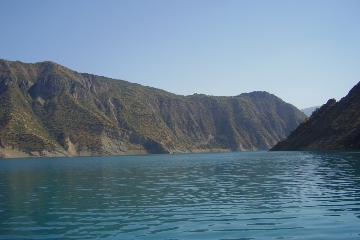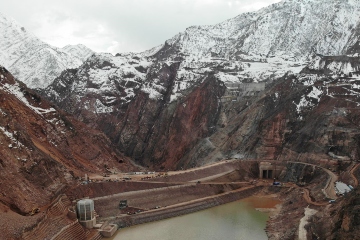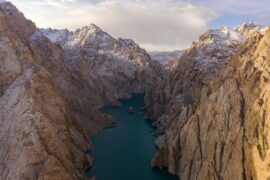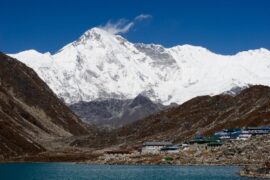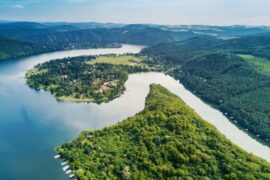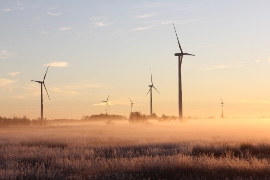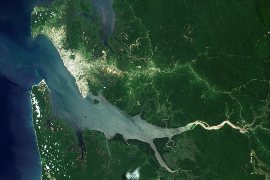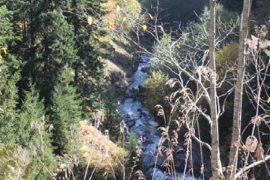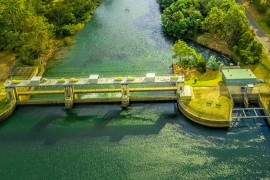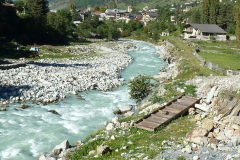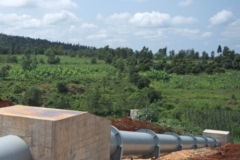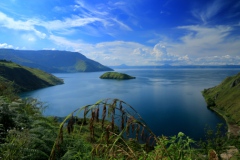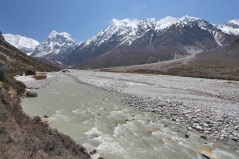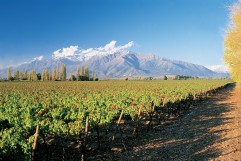Challenge
The world faces a fundamental challenge: meet the growing global demand for affordable electricity to power economies and eradicate poverty, while drastically reducing carbon emissions and safeguarding the world’s rivers, wetlands and forests and the communities that depend on them. The reality of climate change demands the world to transition to a more sustainable energy future.
Hydropower is a key low-carbon option, but its use has often been linked to high social and environmental impacts —such as the displacement of communities and the loss of many of the world’s rivers and their diverse ecosystems and benefits. Hydropower development faces the challenge to propose credible alternatives to diminish the need for such high-impact dams.
A basin-level or system-scale approach to hydropower development is required to ensure sustainable results of hydropower projects across the world. Landscape planning approaches, integrating environmental demands and other uses and users, can sustain ecosystem services and offer the potential for broad economic benefits in addition to energy generation, such as water supply, flood-risk management, irrigation, and habitat for migratory fish and biodiversity. Additionally, it provides a platform to better engage projects with stakeholders, and other projects operating in the same basin. To support a system-scale approach, basin-level water resources assessments are needed, accounting for these possible benefits.
FutureWater approach
FutureWater applies a state-of-the-art toolset, including tools that are being developed in-house, to a wide range of sustainable hydropower projects. Depending on the context and issues of concern, a tool and data sources are selected, including remote sensing datasets on glacier extent for high mountain areas, reanalysis datasets for a consistent global climate data, and hydrological models.
For example, for small hydropower run-of-river projects in high mountain areas, typically the glacio-hydrological model SPHY is applied to assess flow duration curves and floods extremes, for technical due diligence or feasibility studies. The same model, in combination with climate model ensemble outputs, can be used to assess climate risks, climate change impacts and to evaluate the scope for increasing climate resilience to hydropower assets.
For basin-level and landscape-planning approaches, FutureWater has extensive experience with assessing the potential for Sustainable Land Management activities in a catchment, its costs and benefits, its impact on hydropower generation and demands and supplies of other uses and users and environmental flows. To support the dialogue with stakeholders and provide quantitative evidence on possible business cases for revenue sharing schemes, return-on-investment analysis can be performed and presented in ways that are digestible for a wide public.
Our Solutions
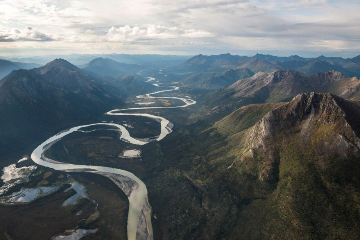
Hydrological Modelling
SPHY is a spatial water balance model that integrates hydrological processes and is flexible in scale and time. We apply SPHY in various projects, such as understanding hydrological changes, watershed management, irrigation management, runoff forecasting, land degradation and restoration, energy assessment and hydroclimatic extremes research. The model can be adapted to different climatic conditions and uses different input data.
Related projects
-
Climate Change Risk Analysis for Rogun Dam
The Rogun HPP is a large project (3,780MW) under construction located on the Vakhsh River located about 110 km East-Northeast of Dushanbe, the capital of Tajikistan. It is a project that will have a large reservoir capable of providing seasonal regulation. It will supply firm energy during the winter months...
-
Climate Risk Assessment for the Rogun Dam in Tajikistan
The Rogun HPP is a large project (3,780MW) under construction located on the Vakhsh River in Tajikistan. It will supply firm energy during the winter months when demand for electricity is the highest in Tajikistan and will allow for exports of clean electricity to the Central Asia (CA) region and...
-
Climate Risk Assessment: Golovnaya Hydropower Plant, Tajikistan
The Asian Development Bank (ADB) is supporting the rehabilitation of the 240-MW Golovnaya Hydropower Plant in Tajikistan, aiming to increase renewable energy supply from 743 GWh to 1,130 GWh. The project includes refurbishing the generation units. FutureWater supported ADB by assessing the climate risk and adaptation options for this investment...
-
WE-ACT: Water Efficient Allocation in a Central Asian Transboundary River Basin
The WE-ACT project’s overall goal is to demonstrate a Decision Support System (DSS) for water allocation in a Central Asian transboundary river to increase shared benefits and foster the adaptation of water resources management and planning to climate change.
-
Climate Risk and Adaptation Assessment for Hydropower Project in Nepal
Climate risk and adaptation (CRA) assessment is required for the 635 MW Dudhkoshi hydroelectric project (DKSHEP) to ensure the project addresses climate change mitigation and adaptation in accordance with ADB’s requirements. The initial Climate Risk Assessment (CRA) by FutureWater in 2021 suggested the project is likely to be affected by...
-
SOS-Water: Water Resources System Safe Operating Space in a Changing Climate and Society
The SOS-Water Project endeavours to set out the boundaries within which the Earth’s capacity to provide life-support systems for humanity is not endangered, and humanity’s capacity to adapt to environmental changes is not overburdened. Crossing such thresholds or tipping points in the complex Earth system could result in abrupt and...
-
Climate Risk and Adaptation Assessment for Nepal’s Power Sector
Nepal’s power sector predominantly relies on hydropower generation. Hydropower is vulnerable to climate change and natural disasters caused by climate change. An understanding of the future impact of climate change on hydropower assets and their performance is important for the successful implementation of hydropower projects. Climate risk and adaptation (CRA)...
-
Renewable Energy for Climate Resilience in Bhutan
The goal of the Asian Development Bank project ‘Renewable Energy for Climate Resilience’ in Bhutan is to diversify Bhutan’s energy portfolio. The rationale for diversification is related to the expectation that climate change impacts on the cryosphere and hydrology in Bhutan will lead to less reliable flows, in particular outside...
-
Improved Watershed and Forestry Activities to Secure Hydropower
This study supports Gabon in preserving Hydrologic Ecosystem Services in a river basin which faces challenges due to planned hydropower and forestry operations. It will evaluate various watershed management scenarios which may improve hydrological flow conditions and hydropower options. FutureWater analyzes hydrological ecosystem services provision in the Komo basin through...
-
Hydrological Assessment for Hydropower in the Lukhra River
The objective was to develop a hydrological assessment for a planned run-of-river hydropower plant in the Lukhra river basin in Georgia. There is no observed river discharge data available. Hence, the assessment was developed based on hydrological simulations of the basin using the SPHY model (Terink et al., 2015) and...
-
eLearning on Hydrology and Climate Change for Hydropower Professionals
Hydropower production in Indonesia is the main renewable energy source in the country. There is a potential to double the capacity by building new hydropower plants and to optimize current plants. PLN is the main hydropower company in the country. The project aims at enhancing the capacity of its staff...
-
Feasibility Study for the Development of a ‘Small-hydro Climate Risk Assessment Tool’
Small hydropower (1 - 20 MW) does not require a Climate Risk Assessments yet, but this will eventually happen in the future. Investors are highly interested in the profitability of these small hydropower stations, especially because of the uncertainty caused by future climate change. Current methods for Climate Risk Assessments...
-
Glacio-hydrological Assessment for Hydropower in the Nakhra River
The objective was to develop a glacio-hydrological assessment for planned run-of-river hydropower plant locations in the Nakhraa river basin in Georgia. The availability of observed river flow data is limited. Hence the assessment was developed based on hydrological simulations of the basin using the SPHY model (Terink et al., 2015)....
-
Glacio-hydrological assessment for hydropower, Mestiachala river, Georgia
The objective of this project was to develop a hydrological assessment for two potential hydropower plant locations in the Mestiachala basin in Georgia. The availability of observed river discharge data is limited. Hence the assessment was developed based on hydrological simulations of the basin using the SPHY model (Terink et...
-
Improved catchment management for small hydropower
This study assessed the impacts of various investment portfolios for catchment management activities on the cost-benefits of small hydropower schemes, in two case study catchments in Kenya and Tanzania, and analyzes the return-on-investment for the hydropower developers. Catchment degradation trends, climate change impacts and socio-economic changes increasing competing water use...
-
Climate Risk Assessment Using the Decision Tree Framework
The novel methodology that is piloted by the World Bank for assessing climate risks versus other risks on water resource projects, called the Decision Tree Framework (DTF), is applied to two two planned investments: (1) flood protection infrastructure and irrigated cropland expansion on the Nzoia river, Kenya; and (2) the...
-
Hydrological assessment for two potential sites for run-of-river hydropower, southwestern Georgia
A hydrological assessment was carried out for two sites where run-of-river hydropower plants are planned, in the southwestern part of Georgia. Only very limited streamflow data were available, so the assessment was based mainly on hydrological modelling of the basin upstream of the points of interest. Principally global datasets were...
-
Hydrological pre-feasibility assessment for a potential hydropower plant, North Sumatra, Indonesia
Following the successful development of hydropower facilities in Indonesia, a new project was established to study the potentials for the development of a hydro-electric power plant in the Tripa Basin, North Sumatra, Indonesia. To make a go/no-go decision of a more detailed feasibility study, a pre-feasibility study is undertaken to...
-
Hydropower Development Assessment for the Tamakoshi River Basin
The overall objective of this project is to improve the understanding of the expected impacts of climate change on water availability in the context of potential hydropower development in the Tamakoshi River Basin. Specifically, the project aims to (i) Understand the current baseline hydrological regime of the Tamakoshi River Basin,...
-
Review Climate Change Hindu-Kush-Himalaya
FutureWater provided a comprehensive review study on climate change and the impacts on cryosphere, hydrological regimes and glacier lakes in the Indus, Ganges, and Brahmaputra river basins. This review study was done in the context of future hydropower development in the region.
-
Central Asia Regional Risk Assessment for Water Related Energy Sector Impacts
The objective of this study was to support the “Central Asia Regional Energy Sector Vulnerability Study” led by Industrial Economics (IEc) and funded by the World Bank, by carrying out an expanded risk assessment for water availability and water related energy sector impacts in Central Asia. The work built on...
-
INTOGENER: Integration of EO data and GNSS-R signals for ENERgy applications
The need for accurate short and mid-term forecasting of the water flow generated from snowmelt in mountain basins is an important component for water management and hydropower activities. Due to the remoteness and difficult access to basins especially in cold weather conditions, where in-situ snow measurements, water level monitoring and...

